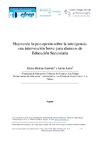Identificador persistente para citar o vincular este elemento:
https://accedacris.ulpgc.es/jspui/handle/10553/35485
| Campo DC | Valor | idioma |
|---|---|---|
| dc.contributor.author | Medina-Garrido, Elena | en_US |
| dc.contributor.author | León, Jaime | en_US |
| dc.date.accessioned | 2018-04-23T11:59:29Z | - |
| dc.date.available | 2018-04-23T11:59:29Z | - |
| dc.date.issued | 2017 | en_US |
| dc.identifier.issn | 1699-5880 | en_US |
| dc.identifier.uri | https://accedacris.ulpgc.es/handle/10553/35485 | - |
| dc.description.abstract | Introducción. En Educación Secundaria es frecuente encontrarse con alumnos que piensan que tal vez no sean lo suficientemente inteligentes como para superar con éxito esta etapa educativa. Pensar en la inteligencia como algo fijo o modificable influye en el rendimiento académico, por lo que nos preguntamos si una intervención breve puede cambiar las ideas del alumnado sobre su inteligencia. El objetivo principal de esta investigación fue diseñar y analizar la eficacia de una intervención, para que el alumnado piense que la inteligencia no es algo innato e inmodificable, sino que todos tenemos un potencial intelectual y que depende de nosotros mismos trabajar para desarrollarlo. Método. El programa se diseñó siguiendo los principios de las intervenciones breves, y se llevó a cabo con alumnos de 1º de Educación Secundaria Obligatoria. Para analizar su eficacia se realizó un estudio con grupo cuasi-experimental y de cuasi-control, con una evaluación previa y dos posteriores a la intervención. Resultados. Mediante un modelo multinivel se observó que la trayectoria del grupo experimental fue diferente a la del grupo control, obteniendo evidencias de que los alumnos del grupo experimental disminuyeron sus creencias acerca de la inteligencia como algo estable e inmodificable. Discusión y conclusiones. Este trabajo puede servir como punto de partida para que futuros trabajos mejoren el rendimiento académico de una forma sencilla, replicable y fácilmente escalable | en_US |
| dc.description.abstract | .Introduction. Holding a fix or an incremental mindset influence academic performance; we wonder if an intervention would change students' mindsets. The main goal of this study was to design and analyse the effectiveness of an easy to scale intervention to diminish students' belief about intelligence as something innate and fix, and think that we all have an intellectual potential that depends on ourselves to work it and, thus, maximize our performance. Method. The program was designed following the guidelines of brief interventions, because of their numerous benefits, and it was tested with students from first year of Compulsory Secondary Education. To test its efficacy, we ran a study comparing an experimental and control group with one prior and two post-intervention assessments. Results. We observed using a multilevel model that the trajectory of the experimental group was different from the control group, obtaining evidence that students in the experimental group decreased their beliefs about intelligence as something fix. Discussion and Conclusion. This work may serve as a starting point for future work to improve academic performance in a simple, easily replicable and scalable way. | en_US |
| dc.language | spa | en_US |
| dc.relation.ispartof | Electronic Journal of Research in Educational Psychology | en_US |
| dc.source | Electronic Journal of Research in Educational Psychology[ISSN 1699-5880],v. 15, p. 377-397 | en_US |
| dc.subject | 6102 Psicología del niño y del adolescente | en_US |
| dc.subject | 58 Pedagogía | en_US |
| dc.subject.other | Ideas implícitas sobre la inteligencia | en_US |
| dc.subject.other | Desmotivación | en_US |
| dc.subject.other | Intervención | en_US |
| dc.subject.other | Estudio experimental | en_US |
| dc.subject.other | Educación secundaria | en_US |
| dc.subject.other | Mindsets | en_US |
| dc.subject.other | Motivation | en_US |
| dc.subject.other | Intervention | en_US |
| dc.subject.other | Experimental design | en_US |
| dc.subject.other | Secondary education | en_US |
| dc.title | Mejorando la percepción sobre la inteligencia: una intervención breve para alumnos de Educación Secundaria | en_US |
| dc.title.alternative | Improving the perception of inteligence: a short intervention for secondary school students | en_US |
| dc.type | info:eu-repo/semantics/Article | es |
| dc.type | info:eu-repo/semantics/Article | en_US |
| dc.type | Article | es |
| dc.identifier.doi | 10.14204/ejrep.42.16051 | |
| dc.identifier.scopus | 85044526879 | |
| dc.identifier.isi | 000409073000007 | - |
| dc.contributor.authorscopusid | 57194641347 | |
| dc.contributor.authorscopusid | 36186942700 | |
| dc.identifier.eissn | 1696-2095 | - |
| dc.description.lastpage | 397 | - |
| dc.identifier.issue | 2 | - |
| dc.description.firstpage | 377 | - |
| dc.relation.volume | 15 | - |
| dc.investigacion | Artes y Humanidades | en_US |
| dc.type2 | Artículo | en_US |
| dc.contributor.daisngid | 10012745 | |
| dc.contributor.daisngid | 2657129 | |
| dc.contributor.wosstandard | WOS:Medina-Garrido, E | |
| dc.contributor.wosstandard | WOS:Leon, J | |
| dc.date.coverdate | Enero 2017 | |
| dc.identifier.ulpgc | Sí | es |
| dc.description.sjr | 0,263 | |
| dc.description.sjrq | Q3 | |
| dc.description.sellofecyt | Sello FECYT | |
| dc.description.esci | ESCI | |
| dc.description.dialnetimpact | 0,0 | |
| dc.description.dialnetq | Q1 | |
| dc.description.dialnetd | D2 | |
| item.fulltext | Con texto completo | - |
| item.grantfulltext | open | - |
| crisitem.author.dept | GIR IATEXT: Didáctica, Aprendizaje y Motivación en Contextos Específicos | - |
| crisitem.author.dept | IU de Análisis y Aplicaciones Textuales | - |
| crisitem.author.dept | Departamento de Educación | - |
| crisitem.author.orcid | 0000-0002-9587-4047 | - |
| crisitem.author.parentorg | IU de Análisis y Aplicaciones Textuales | - |
| crisitem.author.fullName | León González-Vélez, Jaime José | - |
| Colección: | Artículos | |
Citas SCOPUSTM
4
actualizado el 08-jun-2025
Citas de WEB OF SCIENCETM
Citations
4
actualizado el 18-ene-2026
Visitas
228
actualizado el 15-ene-2026
Descargas
120
actualizado el 15-ene-2026
Google ScholarTM
Verifica
Altmetric
Comparte
Exporta metadatos
Los elementos en ULPGC accedaCRIS están protegidos por derechos de autor con todos los derechos reservados, a menos que se indique lo contrario.
